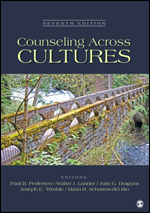Counseling Across Cultures
Paul B. Pedersen - Syracuse University (Emeritus); University of Hawaii (Visiting)
Walter J. Lonner - Western Washington University, USA (Emeritus)
Juris G. Draguns - Pennsylvania State University, USA
Joseph E. Trimble - Western Washington University, USA
Maria R. Scharron-del Rio - Brooklyn College, City University of New York
Offering a primary focus on North American cultural and ethnic diversity while addressing global questions and issues, Counseling Across Cultures, Seventh Edition draws on the expertise of 48 invited contributors to examine the cultural context of accurate assessment and appropriate interventions in counseling diverse clients. The book’s chapters highlight work with African Americans, Asian Americans, Latinos/as, American Indians, refugees, individuals in marginalized situations, international students, those with widely varying religious beliefs, and many others. Edited by pioneers in multicultural counseling, this volume articulates the positive contributions that can be achieved when multicultural awareness is incorporated into the training of counselors.
Available formats
See what’s new to this edition by selecting the Features tab on this page. Should you need additional information or have questions regarding the HEOA information provided for this title, including what is new to this edition, please email sageheoa@sagepub.com. Please include your name, contact information, and the name of the title for which you would like more information. For information on the HEOA, please go to http://ed.gov/policy/highered/leg/hea08/index.html.
For assistance with your order: Please email us at textsales@sagepub.com or connect with your SAGE representative.
SAGE
2455 Teller Road
Thousand Oaks, CA 91320
www.sagepub.com
Password-protected Instructor Resources include the following:
- A Microsoft® Word® test bank is available containing multiple choice, true/false, short answer, and essay questions for each chapter. The test bank provides you with a diverse range of pre-written options as well as the opportunity for editing any question and/or inserting your own personalized questions to effectively assess students’ progress and understanding.
- A Respondus electronic test bank, is available and can be used on PCs. The test bank contains multiple choice, true/false, short answer, and essay questions for each chapter and provides you with a diverse range of pre-written options as well as the opportunity for editing any question and/or inserting your own personalized questions to effectively assess students’ progress and understanding. Respondus is also compatible with many popular learning management systems so you can easily get your test questions into your online course.
- Editable, chapter-specific Microsoft® PowerPoint® slides offer you complete flexibility in easily creating a multimedia presentation for your course.
- Sample course syllabi for semester and quarter courses provide suggested models for use when creating the syllabi for your courses.
- Lively and stimulating ideas for class activities that can be used in class to reinforce active learning. The activities apply to individual or group projects.
- Author-created, chapter-specific case studies provide opportunities for readers to analyze applied situations.
- Chapter-specific discussion questions help launch classroom interaction by prompting students to engage with the material and by reinforcing important content.
- Web resources are included for further research and insights.
The open-access Student Study Site includes the following:
- Learning objectives reinforce the most important material
- Case studies and discussion questions help students apply chapter principles
NEW TO THIS EDITION:
- A new theme, the concept of Inclusive Cultural Empathy (ICE), permeates the book.
- A fifth co-editor, María R. Scharrón-del Río, adds another perspective from professional practice in multicultural counseling.
- New and emerging issues are discussed from the perspective of a wide range of expert contributors.
- The number of topics has been increased while chapter lengths have been streamlined to fit with academic class assignments.
- Numerous new invited authors and co-authors, including recent PhDs in the field and advanced graduate students, enhance current perspectives.
- The popular “Critical Incidents” format now includes all-new material for discussion.
- An enhanced emphasis on practical, specific, concrete interventions in multicultural settings prepares readers for effective practice with diverse client populations.
KEY FEATURES:
- The book is edited by pioneers in the field who helped found the multicultural movement in the 1980s.
- A useful five-part, 24-chapter format provides balanced coverage.
- Broad coverage explores a wide range of topics, from spirituality in counseling across cultures to culturally appropriate counseling interventions with diverse client populations.
- Critical Incidents (expanded cases) offer students the opportunity to analyze and think critically about a variety of cultural situations.

